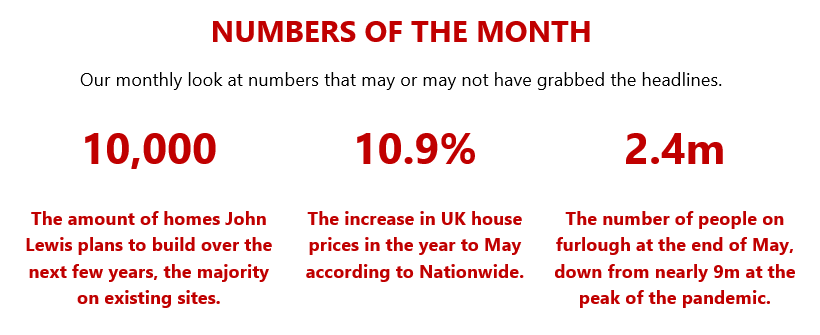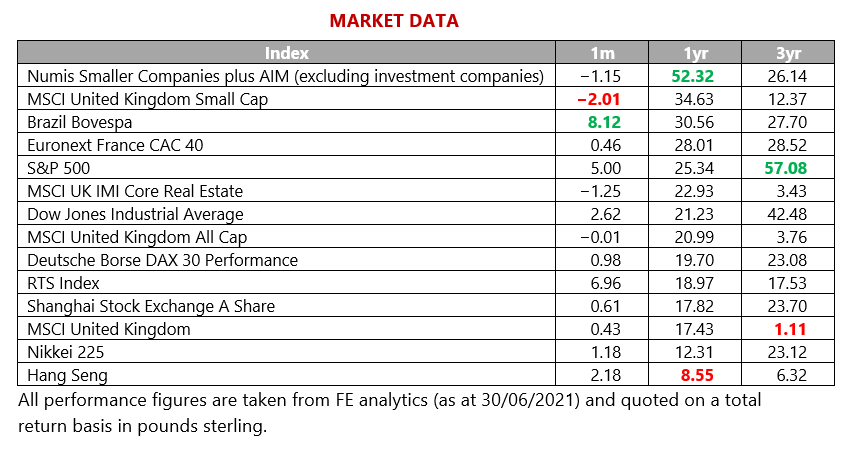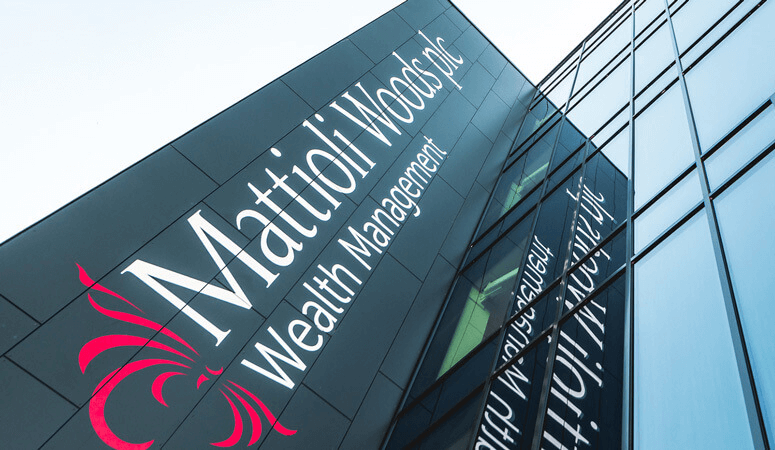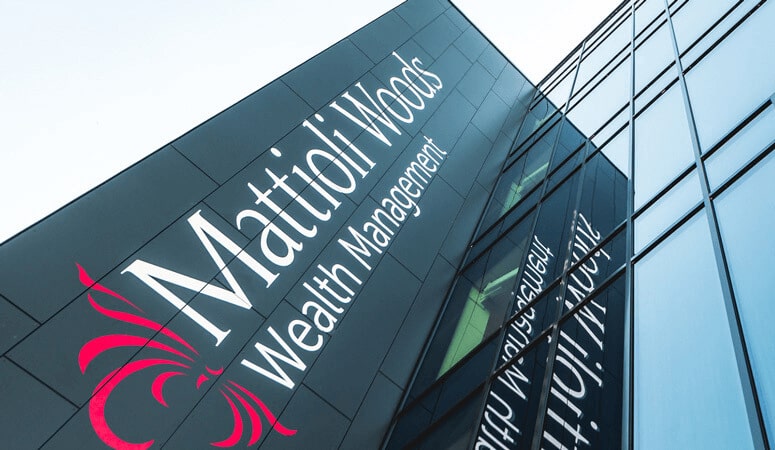United Kingdom - July 2021
Our theme this month is islands. Norway and Sweden each have more than 200,000 islands; others will tell you that there aren’t that many in the world – as ever, definition is vital. Does a definition really matter though? If you are on an island, you think it is an island, everyone on it calls it an island, so is that enough? What about an archipelago? Is Africa a continent or a massive island?
Many island economies rely on tourism, from Tahiti and Tonga to Iceland and Ibiza. Global recessions, natural disasters and, yes, pandemics, all have the ability to wreak havoc. Despite this, all survive, all seem to be able to adapt, and this is an analogy that is important right now for many companies and indeed whole sectors/economies.
The differences between the economic outcomes for sectors has rarely been starker than since March 2020. Some have soared while others have collapsed and, yes, there has been something of a rotation, a changing of the guard, but there remain major concerns. No surprise then that the PM is pushing for a full reopening later this month. Other countries are waiting and no doubt watching from behind the sofa how a pretty comprehensively vaccinated society looks a few weeks down the line.
Talking of watching from behind the sofa, we have an interesting analogy in play right now between the UK’s main (London listed) equity market and the England football team. There is increased interest and more value and quality on display than might have been apparent in recent months. Many more people are talking about both, and sterling is a vital ingredient too. Perhaps most of concern is that there seems to be something of a consensus building that both UK equities and the England football team could be on the cusp of something big. We are unashamedly interested (and keen to see success for) both … but some remain behind the sofa for now.
Flaming June – meant to be a comment on the weather rather than an expression of exasperation, though both seem to work with hindsight. Now into the second half of the year, we expect the UK economy to flourish, inflation to rise (and probably fall back by the year end) and surprises to continue, some positive, some (unfortunately) less so. Owning UK equities for the long term looks absolutely right from here – shorter term, challenges do remain, especially on a sector by sector basis, and just maybe the UK has the right mix for H2 of 2021.
Term or word(s) to watch: wages – compensation for an employee’s services, including salary, bonus, commission, etc. We know you know that. Do you know how important the level of wages is to the UK economy?
The coming months are likely to be difficult ones for UK employers in the ‘recovery’ sectors of travel and leisure. It is here that we are seeing bottlenecks in the supply of labour, which has resulted in higher pay for new staff and labour shortages. How to respond? For example, should all staff be given pay increases to match the new recruits in order to ensure retention? Alternatively, what if the ending of furlough in September leads to a wave of bankruptcies and a flood of new (cheaper) labour?
Investors are also concerned: higher wages could easily lead to a surge in demand, leading to a wages/prices spiral. This type of inflation is much harder to eradicate than the current supply-side inflation we are experiencing, and the Bank of England may look to break it with higher interest rates, with negative consequences for fixed income and unpredictable consequences for other asset classes.
There are societal implications. Between 1960 and 1980 the share of wages as a percentage of UK national income fluctuated between 58% and 61%. The decline in trade union power and increasing globalisation and automation led to a fall in that number to around 50% over the past decade. Shareholders have benefited at the expense of labour; the profit share of national income has steadily risen since 1980.
As investors, we might at first think this a good thing. However, and in keeping with the theme of the month, we must remember that ‘no man is an island’. As Karl Marx observed, an irony of capitalism is that unless increased output is exported, wages must be allowed to rise to allow workers to buy the new goods produced. The pendulum traditionally swings between the interests of labour and capital. There are convincing arguments that after a long period that favoured capital, it is now time for labour to have a bigger slice of the economic pie, for the best long-term interest of all. Just beware lurking inflation if this comes to pass …
North America - July 2021
US markets made gains in June that extended into July with the major US stock indices closing at record highs on Friday, 2 July. What were the main catalysts for this uplift in markets? To put it simply, jobs and roads.
Last month, President Joe Biden announced a long awaited bipartisan agreement on a $953bn infrastructure plan. While this is a smaller package than the Biden administration initially proposed, the deal has been billed as the largest investment in public transit in US history. Traditional infrastructure is a big winner as the plan will focus on upgrading roads, bridges and broadband networks. The deal does include $7.5 billion in funds for electric vehicle charging stations, but it was significantly watered down in terms of climate measures, in order to attract Republican support.
We may yet see Democrats move measures such as the Clean Energy Standard through Congress via the vehicle of budget reconciliation. The brutal heatwave that has been agonising the Pacific Northwest over the past week, causing electrical cables to melt and highways to buckle, certainly lends powerful evidentiary support for the case to tackle climate change with urgency.
Data continued to fuel investor expectations that the US economy’s post-vaccine recovery remains intact. US job growth accelerated in June after a spring lull as non-farm payrolls increased by 850,000 jobs after rising by 583,000 in May. This is the strongest rise since last August and exceeded economists’ expectations. The unemployment rate ticked up to 5.9% as more Americans joined the labour (they would say labor) force.
The barrage of positive data seems to have shifted investor opinions on monetary policy outlook. Polls indicate that economists now believe there will be at least two interest rate rises by the end of 2023. This is in line with projections from the Federal Reserve’s (Fed) June meeting where officials indicated that growth was going to be significantly stronger than they had pencilled in as recently as March.
This subtle but important step acknowledges that while the Fed will not be rushing to tighten policy unless they see evidence of significant substantial economic progress, they are also not willing to allow inflation to become ‘unruly’.
Although these developments have caused equity markets to soar and the US dollar to make gains, volatility in the market has collapsed. Broadly, a large proportion of investors appear to be on pause, awaiting further data due later in the year to confirm whether or not inflation will pass through the system. The big question on investors’ minds now is whether inflation will prove to be transitory or if it will become something much more enduring and serious.
Why settle for owning a house in the US when you can possess your very own island? Take the East Coast state of Maine as an example; homes cost around $280,437 (c. £202,000) on average, but according to Private Islands Inc. for around $395,000 (c. £285,000), you could purchase your very own private island in Maine’s mid-coast region.
Our exposure to US equities continues to be primarily via thematic areas where we see long-term drivers of demand growth. We have significant positions in companies that are facilitating the move to a more sustainable economy and look set to benefit from the Biden administration’s legislative agenda.
Europe - July 2021
The more infectious delta variant of the virus continues to spread through Europe and the European Centre for Disease Control (ECDC) estimates that it will account for 90% of all cases by the end of August. The holiday season along with the easing of restrictions in some countries may also be factors enabling this faster rate of spread. This has led to many countries accelerating or expanding their vaccination programmes including in the Netherlands, where those aged 12 to 17 are now included and in Poland where a lottery offering new cars is only open to those who are fully vaccinated.
Islands featured heavily in Napoleon Bonaparte’s life with his exiles on the Italian island of Elba (1814–15) and the remote St Helena in the mid-Atlantic where he died (1815–21). He was born on the island of Corsica in 1769 and history might have been very different had he been born just a few years earlier as he would not have been French! Up until 1767, Corsica was under the Republic of Genoa, though it had experienced an independence rebellion for almost 40 years that led to the then exhausted Genoese selling the Island to France.
Further actions to tackle the virus may be required by some states, which is a potential headwind for the European economy. Economic data has continued to be broadly positive, with the numbers of unemployed in the EU dropping by 382,000 in May, representing the third month of this downwards trajectory.
There is also survey data suggesting manufacturers are hiring at their highest rate in 20 years. Furloughed workers are not included in the figures, but that number is also falling with German data in April showing 2.3 million people, down from just under 6 million a year earlier.
Unemployment continues to fall as positive momentum builds in Europe. The spread of the delta variant may see further bumps in the road although the improving vaccination rate will offset this over time. We are constructive on the outlook for Europe and with cheaper valuations than US companies, we include allocations in our more adventurous portfolios.
Japan - July 2021
The improved outlook for Japan has attracted overseas investors over recent years. Indeed, foreign buyers of stocks have played an important role in pushing the indices higher. Their importance was arguably underlined by the negative impacts of their withdrawing funds in the period where conviction in Abenomics and the associated policies wore off. Foreign investors make up almost a third of money in the Japanese market and the ageing population of the country means that the domestic pool of investors is reducing.
Much has been made, by others and by us, of the recent corporate governance improvements and how these have made the country’s companies/stocks more attractive to foreign investors. There have been some recent developments that have taken the edge off this though. The Japanese authorities have introduced rules whereby overseas buyers of more than 1% stakes in a range of companies (for which the criterion is less than clear/convincing) must seek government approval first.
It is the sort of intervention one might expect in China not in Japan. A recent report has also found that Toshiba colluded with government officials to obstruct overseas investors. This is disappointing; however, we have seen some positive change in recent years and expecting rapid, wholesale transformation in a country like Japan is frankly unrealistic.
Japan consists of five main islands – Hokkaido, Honshu, Shikoku, Kyushu and Okinawa, but the country actually spans an archipelago of almost 7,000 islands.
Even if one sets aside the argument for corporate change, Japan still has its appeals. True, there is a discount to global peers explicable by the unhelpful shareholder culture that has been observable historically, but this valuation advantage should not be dismissed lightly. Positions are unchanged.
Asia Pacific - July 2021
It looks as if the wider Asian region will have to contend with a difficult period in terms of Covid-19 with a series of outbreaks reported there in the last few weeks. Nowhere is going to be exempt from these challenges of course, but there are some excellent opportunities around. In truth, some of the slow pace of inoculations across the region can be explained by the success of early measures that were adopted to control the spread of the virus.
It used to be the case that a rising dollar was good for the region because of the impact on exports, but an environment of tighter monetary policy means that is not so likely to prove beneficial this time.
There is more financial market integration now between the US and Asia, and borrowings in dollars have increased, so there are a number of mechanisms that may lead to headwinds in the short term. Of course, there are specific areas in which some Asian countries will find the going much more favourable. The shortages in the semiconductor market are well documented and this should mean that Taiwan and South Korea enjoy an uptick in economic growth. Vietnam is continuing to do well, and we have laid out the investment case for that country previously, though again being ‘valuation aware’ is essential here.
We are dealing with a tremendously heterogenous part of the globe – active managers should be able to find excellent opportunities by differentiating properly using both macro and micro drivers. This is certainly not an area where you would want to pursue a passive investment strategy by choice.
As a truly enormous continent, Asia obviously has a suitably baffling number of islands, but ‘The Asia Islands’ is actually a cluster of just three small islands forming part of Eastern Indonesia. Decent trivia question.
The broader economic outlook seems to be littered with uncertainty and against such a backdrop, it seems eminently sensible to allocate to regions with the most favourable structural dynamics. Asia certainly falls in this category and its position in portfolios looks assured for the foreseeable future.
Emerging Markets - July 2021
Emerging market indices are almost unrecognisable, relative to the turn of the century. In just two decades we have seen a move from west to east and from old economy to new. In years gone by, Latin American commodity producers made up a significant portion of the index. Now energy and materials make up a combined 13% of the index and Brazil, once a key constituent, accounts for just 5%. It is no surprise, therefore, to see the once strong relationship between emerging market equities and commodity prices break down.
While many raw materials have continued to perform strongly, broad emerging market indices have tracked sideways over the past six months. Today’s index is dominated by tech giants, with no obvious ties to commodities’ prices, limiting the diversification benefits of owning emerging market equities. Indeed, information technology is now the single largest sector exposure in the MSCI Emerging Markets Index. The fortunes of the index are also now inextricably linked to China. Indeed, China and Taiwan account for 51% of the index.
Investments in Chinese technology have done particularly well over the past decade, but those tracking the index must be conscious of the increasingly tough stance Beijing is taking on the sector. Last year, news that the highly anticipated Ant Financial IPO was to be halted by Chinese regulators spooked many investors in Chinese tech. While some claimed it was an isolated issue, a number of similar stories have followed, leading some to question the attractiveness of the sector, despite its discount to Western peers and obvious growth potential.
More recently, a string of technology platforms have found themselves under investigation by The Cyberspace Administration of China, including an online recruitment company and a lorry hailing app.
News that popular Chinese ride hailing app Didi was under investigation was yet more evidence that tech has to tow the line. It is no coincidence that all three businesses put under investigation are listed in New York and the tough stance from Beijing has weighed on share price performance. Some 34 Chinese companies raised a combined $12.4bn in the US during the first half of 2021, a record breaking figure. Despite the initial excitement, two-thirds of these names now find themselves trading below their IPO price.
The South China Sea is widely regarded as having the potential to be a flashpoint for geo-political tensions over the next decade. The sea plays host to a number of uninhabited archipelagos at the centre of an ongoing territorial dispute. The South China sea contains the Strait of Malacca, the second most used shipping lane in the world, and the islands are thought to contain a range of minerals, making them highly prized.
We retain positions in Asia and emerging markets where appropriate for now, but constantly seek to ensure we are appropriately compensated for the additional risks. We prefer an active approach in both regions.
Spotlight on Royalty Income - July 2021
With interest rates stubbornly low, it is no wonder that investors have had to look beyond savings accounts and government bonds to earn real income. One area that has been increasingly popular is the world of royalties. Royalty payments give a party the right to use a particular asset. The asset owner will typically receive a fixed amount or a percentage of revenues.
Common areas for royalties include mining and book publishing. One such area that has gained increasing popularity in recent years is music royalties. Payments for songs can be made for a range of reasons, with advert use tending to be the most lucrative. Perhaps the area that investors are most excited about now is music streaming.
Platforms such as Spotify have transformed the way in which we consume music. Users have access to 70m+ tracks, with new songs being added at a rate of 60,000 per day. Probably not all ‘bangers’, to be fair.
Producers and artists have been selling their catalogues of songs to royalty vehicles at a rapid rate. The new owners then set about collecting the money that they are owed for use of the songs and attempting to get songs in the catalogues used in adverts or increasing streaming volumes. The relatively predictable stream of income can then, in theory, be paid out to investors.
Padre Island resides off the coast of Texas in the Gulf of Mexico. The island was gifted to the Balli family in 1759 by King Charles III of Spain. In the 1930s, members of the family sold their land in return for royalty payments from resource deposits. Having received nothing for decades, members of the family filed a lawsuit against the seller and eventually won a $10m settlement. For centuries, settlers had taken land for meagre sums and similar disputes still rumble on.
We have met with several managers in the space and think that royalties can make for interesting investments. While we still have some reservations around music royalties and the process of valuing a song, we keep a keen eye on developments in the sector.
Fixed Income - July 2021
More details have been emerging about the latest National Savings and Investments (NS&I) product, the Green Savings Bond. The money in this product will be used by the government to invest in a range of green projects. Details included the amount that can be invested (now confirmed as a healthy £100 – £100,000) and it being a three-year fixed maturity product. Key details are still to be announced, including the interest rate and when these will be available, with the initial summer launch set out in the Budget looking like it will be missed.
The level of demand and where the interest rate is set will be closely watched by bond investors, not least given the potential for Green Gilts to be issued by the government in the future. Setting the rate too low risks a lack of demand as other savings products might look more attractive. Setting the rate too high will raise questions on the value for money that the government is getting, not least because they could fund these projects through other methods, including conventional gilt issuance. Any potential green gilt issuance will have a similar credit rating to conventional gilts (as is backed by the UK Government), but as there will be fewer of these, the market will be less liquid, which may also need to be reflected in their pricing.
While the UK Government has been accused of being slow to issue green bonds, investor demand for these types of instruments has been growing, with over $54bn (£39bn) moving into specialist ESG bond funds in the first five months of 2021.
Corporates have also been using this demand to issue new debt, although some of the issuances will be challenged on their green credentials. One of the most prominent examples was Spanish energy company Repsol, who issued a green bond back in 2017 for projects on their Iberian refining operations. The project was to improve the efficiency of these assets, which improves profitability and energy use and will also extend the life of these operations, meaning more emissions.
Similarly, we have seen green bonds issued by companies to end child labour in their supply chains, which suggest that the company is using child labour in the first place. Both examples show the green name should not necessarily be taken at face value.
Green bonds/gilts have the potential to provide the required finance for green projects; however, these do add a layer of complexity to investors in terms of needing to know what they are investing in, with different interpretations of green existing. We have some exposure in our credit funds where the manager deems the risk–reward characteristics as favourable but have no specific exposure to this as a theme yet.
Commodities - July 2021
The ascent of commodity prices over the last year is well documented and they have become one of the purest forms of expressing inflation concerns. It seems likely that elevated prices are going to be here to stay for the foreseeable future at least, but whether this is the start of a super cycle or not is unclear.
On the demand side of the equation, we are seeing a number of factors that could prove to be ‘transitory’ just as many believe wider inflation will prove to be. Steel, copper and aluminium, for example, have been primary beneficiaries of the sudden explosion in demand after it was so damaged by the Covid-19 crisis. Reopening of economies could well see more funds flowing into goods and services (as people resume their normal activities) rather than more durable goods that involve commodity production.
What seems clear is that there is something of a mismatch between demand and supply that doesn’t feel permanent in nature. This has to temper expectations for sustained further rises in commodity prices and also for the inflationary pressures they might bring.
Those arguing we are on the cusp of another 20-year super cycle would point to the environmental developments and trends towards decarbonisation that are likely to be transformative to the demand profile for certain commodities. The unknowns are sufficiently great for this theory to feel far from proven, but we recognise the possibilities.
Our positioning and exposure remains unchanged for now. The inflation debate is far from clear, but holding some gold and gold equities with a smattering of other precious metals for the more adventurous seems sensible.
Property - July 2021
We usually focus on UK property in this sector, but that is not to say we do not also look at overseas options.
Real estate investment trusts (REITs) and listed property companies are available across most major markets, although there are a few countries where overseas ownership of property is difficult – including China and India.
The case for owning global property over a pure UK focus revolves around diversification (and not just the obvious geographical diversification) to allow investors to add to faster growing economies or ones where there may be supply imbalances in local markets. In our Commentary we frequently speak about the main UK sectors of office, retail and industrials, along with some of the more niche sectors such as leisure and healthcare. Global REITs have an even wider set of opportunities.
This includes residential property REITs in both the US and Europe, which are generally less economically sensitive. Within this sector in the US there are also different sub-sector focused REITs, including apartment buildings and single-family homes. The performance of these REITs during Covid-19 has reflected the trend of Americans wanting (or needing) more space now they are more able to work at home.
Lanai island in Hawaii is the most expensive island in the world, worth $610 million (£443 million) and is owned by Larry Ellison (the founder of Oracle). The previously rumoured interest of the US in purchasing Greenland could blow this figure away, with estimates ranging from $533 billion to $1.1 trillion; however, Denmark asserts that the autonomous territory is not for sale.
There are other areas that are not seen in the UK, such as hotel and casino REITs, which have been disrupted by Covid-19 but are a potential value opportunity as tourism returns. Telecommunications towers and data centre REITs are also available overseas, giving access to the trend of increasing ecommerce displacing high street retail. Perhaps the most niche REITs available are US listed GEO Group and CoreCivic, which own prisons and related secure facilities. You need to be prepared to lock your money up there for sure.
Our property exposure remains focused on the UK despite the diversification potential of global property. We still see sufficient value remaining in the UK names to justify this tilt although we do not rule out adding to global property when this changes.
Responsible Assets - July 2021
Carbon pricing is a complex subject. At its core is the idea that companies should either pay a tax on the carbon emissions they create or pay for the right to emit.
While the merits of each method are debatable, it is widely accepted that forcing companies to view emissions as a financial expense plays a key part in reducing environmental damage. The need for a single carbon pricing mechanism has never been greater.
At present, the World Bank claims there are 64 separate carbon pricing initiatives. However, these only cover 21.5% of global emissions. In May, the carbon price in the EU hit a record €50 per tonne. Research by Dutch asset manager Kempen Capital Management claims that if a $75 per tonne carbon tax were imposed, global stock markets could fall around 20% due to the hit that company profits would take.
The study is certainly thought provoking and perhaps highlights a complacency in financial markets around the costs associated with reducing carbon emissions. However, the study makes two assumptions. The first is that all companies are willing and able to report the emissions associated with both their operations and those from the use of their products. The second is that businesses take the added expenses straight to the bottom line and do not pass costs on to customers.
Clearly, passing these costs on would almost certainly create inflationary pressures. Either way, it seems that equity markets might be rather complacent when it comes to counting the financial cost of meeting the Paris Accord and other climate change targets.
The IMF has suggested a global carbon price floor is needed to meet the goals set out by the Paris Accord, though the imposition would take a significant amount of time. Either way, companies are coming under increasing pressure to get their houses in order when it comes to carbon emissions. Higher carbon taxes will require stricter and more accurate reporting requirements, something that has been in the pipeline for some time.
Currency - July 2021
No real need to remember to head to the travel agents for holiday currency this year or google the best supermarket to pick some up from (you never got it at the airport, did you?) – just an ATM if you really need cash … and that’s the point this month. In any event, even if travel were ‘normal’, how often do we now need cash when travelling?
The currency of the world used to be the greenback … now it is plastic, or even your telephone if you have the right one. Thousands of people in Sweden even have microchips in their palms for convenience.
Ignoring FX costs with your bank/credit card company (not unimportant, but not the point here), in reality it is both safer and much more convenient to avoid cash when travelling, other than smaller notes for tips etc. Your travel currency remains sterling, even if you do get the chance to leave these shores this year.
UK Interest Rates - July 2021
The cost of holding cash over the last year is about to rise. Strictly speaking, the loss of spending power is higher because inflation is higher, but it assumes one would have spent that same cash on specific goods and services, not invested it, not hidden it under the bed and not had it in an interest bearing account (same as hiding it under the bed, just safer). Inflation in the UK is calculated (we are assuming Consumer Price Inflation (CPI) here) based on 650 goods and services.
Literally nobody has exactly that expenditure in a year, possibly not even in a lifetime. The point here is that cash has lost some of its spending power, yes, but it is modest in most cases. Holding cash (like Goldilocks, not too much, not too little) makes sense for most of us most of the time. To maintain spending power, we need to meet (preferably beat) CPI … and cash won’t be doing that anytime soon, so other assets come into play


The Monthly Market Commentary (MMC) is written and researched by Simon Gibson, Richard Smith, Scott Bradshaw, Jonathon Marchant and Lauren Wilson for clients and professional connections of Mattioli Woods, and is for information purposes only. It is not intended to be an invitation to buy, or to act upon the comments made, and all investment decisions should be taken with advice, given appropriate knowledge of the investor’s circumstances. The value of investments and the income from them can fall as well as rise and investors may not get back the full amount invested. Past performance is not a guide to the future. Mattioli Woods is authorised and regulated by the Financial Conduct Authority.
The MMC will always be sent to you by the seventh working day of each month, usually sooner, is normally delivered via email, and is free of charge as the MMC is generally made available to clients who have assets under our management in excess of £200,000, and to all clients under our Discretionary Portfolio Management Service (DPM). Normally, the MMC costs £397 + VAT per annum. Professional advisers and their clients should contact us if they are interested in receiving a monthly copy.
Sources:
www.bbc.co.uk,
www.bloomberg.com,
Financial Express,
www.thedragonsblade.com,
www.express.co.uk,
www.pitstoppin.co.uk,
www.vr-12.com,
www.smalltalkbigresults.wordpress.com,
www.mmn.com,
www.avantida.com,
www.plazmedia.com,
www.sibcyclinenews.com,
www.viewzone.com,
www.anonw.wordpress.com.
All other sources quoted if used directly; except fund managers who will be left anonymous; otherwise, this is the work of Mattioli Woods.





